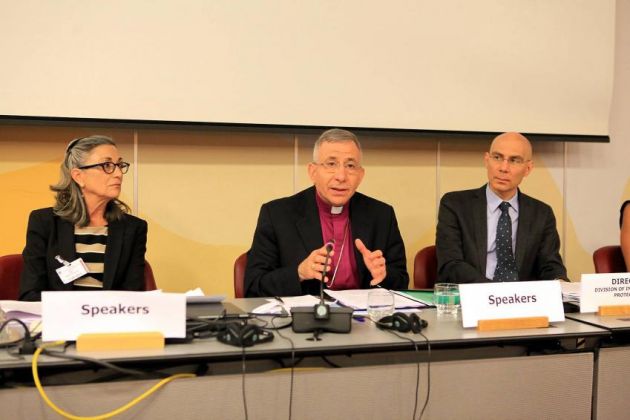UN refugee agency, Lutherans say don't close Dadaab now, Catholic bishop disagrees

A city-sized area in north eastern Kenya which is said to be the world's biggest refugee camp housing 350,000 mainly Somali refugees faces threats of closure by the hosting country.
To make the situation more serious church leaders do not appear to be speaking with one voice on how to deal with Dadaab and its inhabitants who have fled mayhem across the border to live in the 24-year-old camps.
The Lutheran World Federation which plays a key role in the running of Dadaab says it is unrealistic to close the camps following a demand by the Kenya deputy president last week that they be moved.
But a Kenyan Catholic bishop has said in Rome the camps should be moved.
"It is unrealistic at this point to expect that Dadaab should be closed, for several reasons," the LWF's head of communication Heidi P. Martinussen told Ecumenical News in a written statement.
"Firstly, conditions in Somalia are still not such that refugees can return in safety and dignity. It would violate Kenya's international legal obligations and its domestic law to send people back under such circumstances.
"Second, it is not clear that closing the camp would improve the security situation in Kenya. The vast majority of the refugees are themselves victims of persecution and violence, and the great majority of them are women and children.
"Forcibly returning them to Somalia would be a form of collective punishment not against terrorists or criminals, but against innocent vulnerable people."
Dadaab lies about 90 kilometers (50 miles) from the Somali border and was set up nearly in 1991 for fugitives from the mayhem and famine in Somalia.
Both the office of the United Nations High Commissioner for Refugees and the LWF have praised Kenya for generously hosting and protecting refugees from violence and persecution in neighboring Somalia.
On March 31, the five camps in Dadaab had 351,446 refugees, nearly all of who are Somalis.
The LWF works mainly and foremost in the Hagadera where there are 106,000 refugees and at Kambioos where there are 21,000 refugees.
UNHCR spokesperson Karin de Gruijl told journalists on April 14 in Geneva said the refugee agency is "thus urging the Kenyan authorities to give the matter further consideration.
"UNHCR stands ready to work closely with the Government of Kenya to strengthen law enforcement at Dadaab and support other measures to protect refugees and Kenyans alike against possible intrusion by armed actors from across the border."
The Kenyan government has given the UNHCR three months to relocate all Somali refugees in Dadaab refugee back home, Dalsan Radio in Mogadishu reported April 13.
It quoted Kenya's Deputy President William Ruto saying his government had held talks with officials from the U.N. refugee agency on the relocation the Somali refugees.
"We have asked the UNHCR to relocate the refugees in three months failure to which we shall relocate them ourselves," Ruto said the radio station.
On 2 April, Somali extremists from the al-Shabab Islamist movement attacked a college in the Kenyan town of Garissa, killing 148 students.
Kenyan lawmakers and governors had previously accused al-Shabab of hiding out in Dadaab, but there was no link made to the camps after the Garissa slaughter.
The deadly siege at Nairobi's Westgate shopping mall in 2013 was also linked to al-Shabab.
Kenyan forces are fighting alongside African Union troops in Somalia fighting against al-Shabab.
Garissa's Catholic bishop, Paul Darmanin, says that moving Dadaab Refugee Camp back to Somalia must go hand in hand with allocating more resources to Northern Kenya for it to succeed, Vatican Radio reported on April 15.
The Garissa bishop, whose jurisdiction covers Dadaab, warns that an Islamic State situation is unfolding in Garissa as many refugees have already settled down and are more well off and comfortable than even career civil servants working in the area, said the radio station.
"Now that there is a government in Somalia, it is good if the camp is closed and the people are allowed to return back home," said Bishop Darmanin.
He was speaking in Rome during a Kenyan bishops' periodic meeting in the Vatican.
But LWF's Martinussen noted, "Closing the camp would provide a victory for those who carry out attacks such as in Garissa.
"It would reinforce the mind-set that spoke through the attacks, separating people and communities, instilling mistrust and hatred as the driving force in people's relationships."